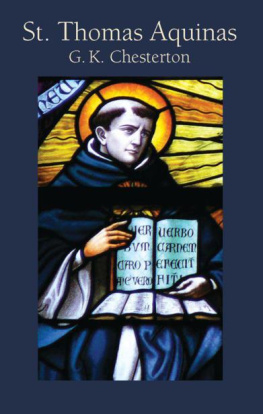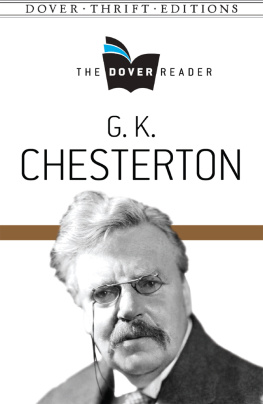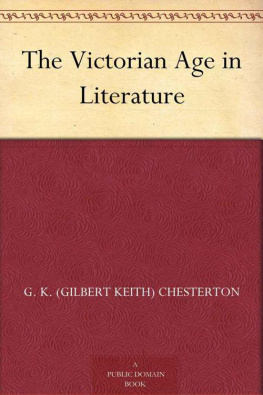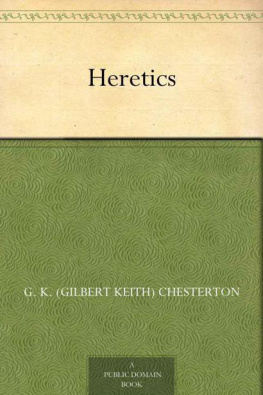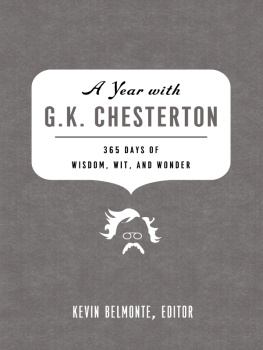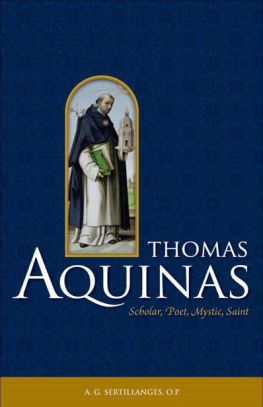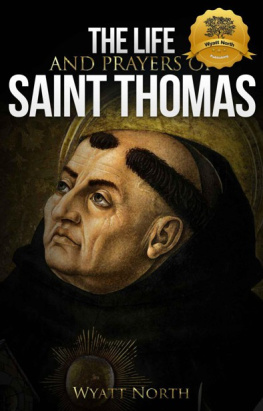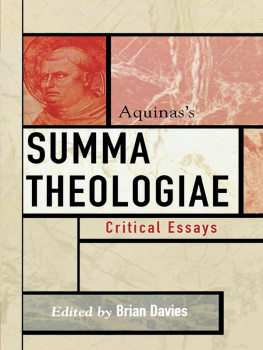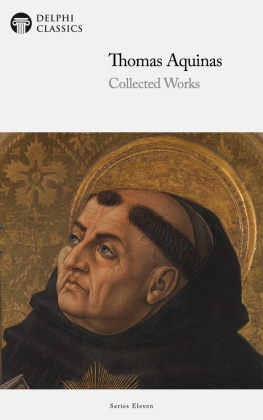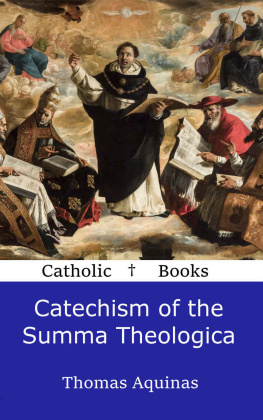ST. THOMAS AQUINAS
To
Dorothy Collins
without whose help the author
would have been more
than normally helpless
G. K. CHESTERTON
St. Thomas Aquinas

Angelico Press reprint edition, 2011
This Angelico edition is a republication of the
work originally published by Sheed & Ward, New York, 1933
No part of this book may be reproduced or transmitted,
in any form or by any means, without permission
For information, address:
Angelico Press, P.O. Box 151011
San Rafael, CA 94915
angelicopress.com
ISBN: 978-1-887593-49-6
Cover Design: Cristy Deming
CONTENTS
INTRODUCTORY NOTE
THIS book makes no pretence to be anything but a popular sketch of a great historical character who ought to be more popular. Its aim will be achieved, if it leads those who have hardly even heard of St. Thomas Aquinas to read about him in better books. But from this necessary limitation certain consequences follow, which should perhaps be allowed for from the start.
First, it follows that the tale is told very largely to those who are not of the communion of St. Thomas; and who may be interested in him as I might be in Confucius or Mahomet. Yet, on the other hand, the very need of presenting a clean-cut outline involved its cutting into other outlines of thought, among those who may think differently. If I write a sketch of Nelson mainly for foreigners, I may have to explain elaborately many things that all Englishmen know, and possibly cut out, for brevity, many details that many Englishmen would like to know. But, on the other side, it would be difficult to write a very vivid and moving narrative of Nelson, while entirely concealing the fact that he fought with the French. It would be futile to make a sketch of St. Thomas and conceal the fact that he fought with heretics; and yet the fact itself may embarrass the very purpose for which it is employed. I can only express the hope, and indeed the confidence, that those who regard me as the heretic will hardly blame me for expressing my own convictions, and certainly not for expressing my heros convictions. There is only one point upon which such a question concerns this very simple narrative. It is the conviction, which I have expressed once or twice in the course of it, that the sixteenth-century schism was really a belated revolt of the thirteenth-century pessimists. It was a back-wash of the old Augustinian Puritanism against the Aristotelian liberality. Without that, I could not place my historical figure in history. But the whole is meant only for a rough sketch of a figure in a landscape; and not of a landscape with figures.
Second, it follows that in any such simplification I can hardly say much of the philosopher, beyond showing that he had a philosophy. I have only, so to speak, given samples of that philosophy. Lastly, it follows that it is practically impossible to deal adequately with the theology. A lady I know picked up a book of selections from St. Thomas, with a commentary; and began hopefully to read a section with the innocent heading, The Simplicity of God. She then laid down the book with a sigh and said, Well, if thats His simplicity, I wonder what His complexity is like. With all respect to that excellent Thomistic commentary, I have no desire to have this book laid down, at the very first glance, with a similar sigh. I have taken the view that the biography is an introduction to the philosophy, and that the philosophy is an introduction to the theology; and that I can only carry the reader just beyond the first stage of the story.
Third, I have not thought it necessary to notice those critics who, from time to time, desperately play to the gallery by reprinting paragraphs of medieval demonology in the hope of horrifying the modern public merely by an unfamiliar language. I have taken it for granted that educated men know that Aquinas and all his contemporaries, and all his opponents for centuries after, did believe in demons, and similar facts, but I have not thought them worth mentioning here, for the simple reason that they do not help to detach or distinguish the portrait. In all that, there was no disagreement between Protestant or Catholic theologians, for all the hundreds of years during which there was any theology; and St. Thomas is not notable as holding such views, except in holding them rather mildly. I have not discussed such matters, not because I have any reason to conceal them, but because they do not in any way personally concern the one person whom it is here my business to reveal. There is hardly room, even as it is, for such a figure in such a frame.
CHAPTER I
On Two Friars
LET me at once anticipate comment by answering to the name of that notorious character, who rushes in where even the Angels of the Angelic Doctor might fear to tread. Some time ago I wrote a little book of this type and shape on St. Francis of Assisi; and some time after (I know not when or how, as the song says, and certainly not why) I promised to write a book of the same size, or the same smallness on St. Thomas Aquinas. The promise was Franciscan only in its rashness; and the parallel was very far from being Thomistic in its logic. You can make a sketch of St. Francis: you could only make a plan of St. Thomas, like the plan of a labyrinthine city. And yet in a sense he would fit into a much larger or a much smaller book. What we really know of his life might be pretty fairly dealt with in a few pages; for he did not, like St. Francis, disappear in a shower of personal anecdotes and popular legends. What we know, or could know, or may eventually have the luck to learn, of his work, will probably fill even more libraries in the future than it has filled in the past. It was allowable to sketch St. Francis in an outline; but with St. Thomas everything depends on the filling up of the outline. It was even medieval in a manner to illuminate a miniature of the Poverello, whose very title is a diminutive. But to make a digest, in the tabloid manner, of the Dumb Ox of Sicily passes all digestive experiments in the matter of an ox in a tea-cup. But we must hope it is possible to make an outline of biography, now that anybody seems capable of writing an outline of history or an outline of anything. Only in the present case the outline is rather an outsize. The gown that could contain the colossal friar is not kept in stock.
I have said that these can only be portraits in outline. But the concrete contrast is here so striking, that even if we actually saw the two human figures in outline, coming over the hill in their friars gowns, we should find that contrast even comic. It would be like seeing, even afar off, the silhouettes of Don Quixote and Sancho Panza, or of Falstaff and Master Slender. St. Francis was a lean and lively little man; thin as a thread and vibrant as a bowstring; and in his motions like an arrow from the bow. All his life was a series of plunges and scampers; darting after the beggar, dashing naked into the woods, tossing himself into the strange ship, hurling himself into the Sultans tent and offering to hurl himself into the fire. In appearance he must have been like a thin brown skeleton autumn leaf dancing eternally before the wind; but in truth it was he that was the wind.
St. Thomas was a huge heavy bull of a man, fat and slow and quiet; very mild and magnanimous but not very sociable; shy, even apart from the humility of holiness; and abstracted, even apart from his occasional and carefully concealed experiences of trance or ecstasy. St. Francis was so fiery and even fidgety that the ecclesiastics, before whom he appeared quite suddenly, thought he was a madman. St. Thomas was so stolid that the scholars, in the schools which he attended regularly, thought he was a dunce. Indeed, he was the sort of schoolboy, not unknown, who would much rather be thought a dunce than have his own dreams invaded, by more active or animated dunces. This external contrast extends to almost every point in the two personalities. It was the paradox of St. Francis that while he was passionately fond of poems, he was rather distrustful of books. It was the outstanding fact about St. Thomas that he loved books and lived on books; that he lived the very life of the clerk or scholar in The Canterbury Tales, who would rather have a hundred books of Aristotle and his philosophy than any wealth the world could give him. When asked for what he thanked God most, he answered simply, I have understood every page I ever read. St. Francis was very vivid in his poems and rather vague in his documents; St. Thomas devoted his whole life to documenting whole systems of Pagan and Christian literature; and occasionally wrote a hymn like a man taking a holiday. They saw the same problem from different angles, of simplicity and subtlety; St. Francis thought it would be enough to pour out his heart to the Mohammedans, to persuade them not to worship Mahound. St. Thomas bothered his head with every hairsplitting distinction and deduction, about the Absolute or the Accident, merely to prevent them from misunderstanding Aristotle. St. Francis was the son of a shopkeeper, or middle class trader; and while his whole life was a revolt against the mercantile life of his father, he retained none the less, something of the quickness and social adaptability which makes the market hum like a hive. In the common phrase, fond as he was of green fields, he did not let the grass grow under his feet. He was what American millionaires and gangsters call a live wire. It is typical of the mechanistic moderns that, even when they try to imagine a live thing, they can only think of a mechanical metaphor from a dead thing. There is such a thing as a live worm; but there is no such thing as a live wire. St. Francis would have heartily agreed that he was a worm; but he was a very live worm. Greatest of all foes to the go-getting ideal, he had certainly abandoned getting, but he was still going. St. Thomas, on the other hand, came out of a world where he might have enjoyed leisure, and he remained one of those men whose labour has something of the placidity of leisure. He was a hard worker, but nobody could possibly mistake him for a hustler. He had something indefinable about him, which marks those who work when they need not work. For he was by birth a gentleman of a great house, and such repose can remain as a habit, when it is no longer a motive. But in him it was expressed only in its most amiable elements; for instance, there was possibly something of it in his effortless courtesy and patience. Every saint is a man before he is a saint; and a saint may be made of every sort or kind of man; and most of us will choose between these different types according to our different tastes. But I will confess that, while the romantic glory of St. Francis has lost nothing of its glamour for me, I have in later years grown to feel almost as much affection, or in some aspects even more, for this man who unconsciously inhabited a large heart and a large head, like one inheriting a large house, and exercised there an equally generous if rather more absent-minded hospitality. There are moments when St. Francis, the most unworldly man who ever walked the world, is almost too efficient for me.

